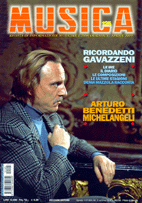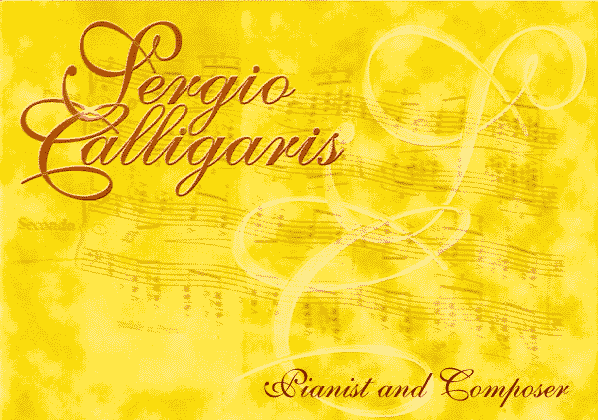 MUSICA Nr.125
MUSICA Nr.125
(Zecchini Editore - Varese)
April 2001 (page 58):
COMPOSERS
Sergio Calligaris:
Tradition as audacity,
by Alessandro Zignani
The Argentinian pianist-composer illustrates the stages of his
creative route
"The inner sense of a composition is in the coherence of its structure. There's no
sense in devising an effective melody if, under it, you don't develop a consequent and
necessary harmonic speech. I mean: in a way to make sense only in that precise context. In
my music, I try to make this formal clarity become expressive intensity. To achieve that,
you must avoid fragmentation: if a theme doesn't evoke, in listener's mind, a set of
symmetries to be planned by the composer as an architect weighs up thrusts and tensions of
an arch, emotion will never rise. Emotion is the consequence of a poetical choice. For
this, when I compose, each theme emerges in my mind already characterized by an harmonic
evolution."
Sergio Calligaris considers the tradition like a square from which centre one can make out
in perspective all lines of an imaginary town shading off. The music is, for him,
persistence of meaning in the truth of the form: "A difficult symbiosis, succeeded in
all only to Bach and a certain Beethoven. For instance, if we think of his last quartets -
one of the models I go back with unchanged amazement - the way the horizontal and the
vertical dimensions, the analytical split of theme elements and their recomposition
according to the strategies of the counterpoint, becoming integrated each others, become a
metalanguage, we find out what music can aspire to achieve: a revelation of the 'final
truths' not as mere semblances, but within the fleeting flow of time. What I find as
moving, in those quartets, is just this sacrality of the instant. In 1995 I wrote a piece
for string orchestra: Toccata, Adagio e Fuga, which tries to go along again this
same game of reflections. So, in the Introduction, I reduced the subsequent melodic line
of the fugue to motif cells. In the Toccata, instead, I had recourse to counterpoint
techniques like inversion and augmentation. I love these, let's say, 'keystones' of the
counterpoint very much, because they allow to convert time to space and to reduce the game
of the progressive harmonic tensions to dimensions of a big cadenza cupola under which
articulation the musical work lights up with reflections".
The artistic evolution of Sergio Calligaris isn't one of the most usual: "I graduated
in composition when I was sixteen in Argentina, where I was born. Then, during the
Fifties, I decided to be a pianist. I didn't want to have a confrontation with a musical
climate based on political labels and the break with the past at all costs. I went back to
composition only in 1978, due to a musical tribute I wanted to dedicate to a friend. So
Renzo's Piano Notebook was born, and thanks to it my creative impulse rose again - also
because of the nature in Rocca di Mezzo, in the Abruzzi, where I withdraw together with my
ghosts of themes".
From his concert career, Calligaris kept a craft ethics bringing him to conceive his works
keeping in mind the technical and psychological characters of their intended performer:
"It was like this with the Sonata for clarinet and piano, that I wrote keeping
in mind the characteristics of Vladimir Ashkenazy and his son Dimitri, to whom it's
dedicated, whereas the Double Concerto op.37 keeps something of the personality of
violinist Sergei Krilov and pianist Stefania Mormone, who often present it in concert. My
most recent work dedicated to a duo is the Double Concerto op.41 for two pianos and
orchestra, premièred last October 29th in Taranto by the piano duo Fabio and Sandro
Gemmiti with the Orchestra della Magna Grecia conducted by Vittorio Parisi: a conductor,
concerning my works, that I consider as a real point of reference".
Beside Beethoven, in Calligaris' poetics Brahms occupies a fundamental place: "This
is why I've been often labelled as 'neoromantic'. But the strict forms, the counterpoint
that I employ are modern and personal meditations on the tradition, not strategies to
squeeze out fascinating themes from old formulas. In this context my admiration for Brahms
finds place, who knew how to work on themes up to split them into germinal microstructures
from which gain that progressive recomposition of balance between intellect and feeling of
which his music consists. Nevertheless, Brahms was considered, in his days, as a
reactionary. We needed Schönberg, with his essay on 'progressism' of brahmsian motif
structures, to make a clean sweep of commonplaces. In my Double Concerto op.41, at
the beginning of each Intermezzos, the orchestra picks up the thematic activity and
recombines it in archs intended to be an ascent to the light of the fulfilled form. In
composing them, it was Brahms' lesson what I felt most strongly as mine. If you don't
build the inner coherence of each parameter from the squandering of each predetermined
formula, the outcome will be a sensation of trick. I can strongly feel all this, when I
compose: just because the performer always remains listening in me".
Moreover, to dissipate the misunderstanding on 'neoromanticism' of Calligaris, a piece
like the Fugue in which op.36 culminates would be enough, with its clearly
atonal course. At least, Calligaris shows to think in 'centres of consonance': connected
harmonies to build up gravitational centres that would be dear to a composer like
Hindemith, with his faith in music's own ability to describe the harmony of the cosmos:
"In fact Hindemith is one of my perennial sources of inspiration. I'm attracted by
his way to recall the Flemish counterpoint, with all its effects of echo and resolution in
retrograde motion of theme cues sometimes deliberately banal. In my last composition, an Ave
Verum for mixed choir or vocal quartet and piano, I wanted to recall in modern terms
this complex and in the same time elementar poetical idea for which music would be our
inner resonance of a metaphysical balance of forces that our mind can't even conceive.
Instead, music makes it, in the same time, beauty to senses and truth revealed to mind. In
front of all this, I'll take no avant-gardes: tradition is the only possibility, to bring
the bright drop of one's own personality into the flow of time. This is why Schumann is my
absolutely beloved composer: the streak of inner voices, the sudden bridling of invention
on the granitic strenght of thematic plot. How humble greatness, how will to communicate,
in that bringing back his heartbeat into the vaults of form, the voices of fathers.
Moreover, Schumann recalls always in an original way the problem of rhythm, without which
there's no form. Originally, there's always an act of intellectual clarity: if I don't
define a rule first, from which infringement the expression can arise, as a dramatic
gesture, I withdraw into my narcisistic satisfaction. And I find that music of these last
decades is even too full of this silence arisen from the excessive will to get oneself
listened".

